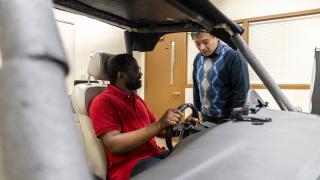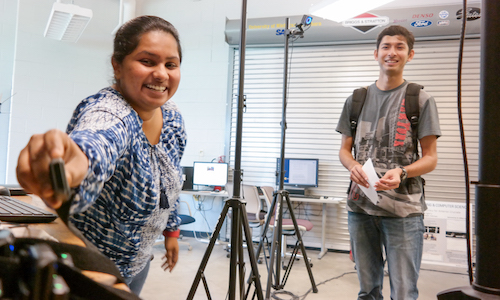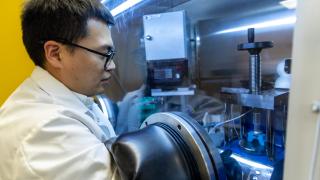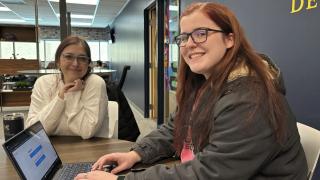
An hour and a half or so into this year’s Open Lab Day at the College of Engineering and Computer Science, it was pretty clear Aditya Shankar Chakrabarty was having his mind blown. In one lab, the current research assistants told him all about their collaboration with a big automaker on hybrid power trains — exactly the kind of thing the first-year automotive systems engineering master’s student is into. Then a little later, the 360-degree-array of motion tracking sensors in Mechanical Engineering Assistant Professor Amanda Esquivel’s lab left him feeling more like he was on a special effects set than the grounds of a university.
“I’ve seen that stuff in movies, but not in real life,” Chakrabarty said through a smile. “In India, the education system is really different. You study with your teachers and textbooks, learn all the formulas, and then you take exams and that’s it. But here, you add all this practical experience. I guess when I started a month ago, I had no idea I’d have a chance to do anything like this."
It’s exactly the kind of takeaway Open Lab Day organizers shoot for during the open-house-style event, which for the past four years has flung open doors at dozens of labs across the college. That allows graduate students, as well as undergraduate students, interested in research to get a better idea of what actually goes on inside.
But Associate Dean for Graduate Education and Research Yi Lu Murphey said it’s also a bit of a matchmaking platform: Graduate students can use the day to meet faculty they might want to work with as research assistants or do a master’s thesis or directed study; and for the two dozen participating faculty (including Murphey herself) it’s an opportunity to recruit new student talent.
“I think what’s really effective about this is that graduate students get to actually see and be inside the labs,” she explained. “Of course, you can find a lot of information online. But it’s not the same as having a really good interaction with a graduate assistant who can tell you all about the very thing you’re interested in doing.”
Indeed, much of the day’s strength seemed to draw from its peer-to-peer conversations. During the opening panel at the IAVS, seven graduate assistants shared their own stories of how they got into research, including snapshots of their current projects. And during the subsequent visits to labs, potential new recruits huddled around current research assistants for informal, but in-depth Q&As and show-and-tell sessions.
It also gave students a window into the kind of camaraderie that’s often the backdrop to research. Over in Esquivel’s lab, as grad assistants Mel Ajdaroski and Ruchika Tadakala held court for Chakrabarty and other students, they got plenty of oohs and aahs showing off the high-tech platform they use to study the movements of athletes. But their warm, laid-back rapport seemed to communicate just as much.
“There is no ‘you’ in a lab,” Ajdaroski said. “It’s true — it’s a lot of teamwork,” Tadakala added, finishing his sentence. “We all have different experiences and different backgrounds, so there will be things that I don’t know that Mel knows more about and the other way around. So the exchange of knowledge isn’t just from your professor to you. The sharing is really between all of us.”




